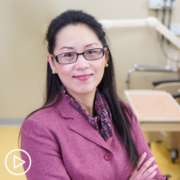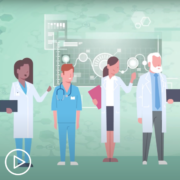Empowering Providers to Explain Lung Cancer Biomarker Testing to Patients
Empowering Providers to Explain Lung Cancer Biomarker Testing to Patients from Patient Empowerment Network on Vimeo.
Non-small cell lung cancer (NSCLC) clinician Dr. Jhanelle Gray from Moffitt Cancer Center has some knowledge to share. NSCLC expert Dr. Gray discusses her experience in biomarker testing and personalized combination therapeutics.
Watch to learn some of the best practices Dr. Gray has developed in treating and empowering NSCLC patients toward more culturally sensitive and equitable care.
See More from Lung Cancer | Empowering Providers to Empower Patients
Related Resources:

How Can Lung Cancer Experts in Academic and Community Settings Collaborate |

|

|
Transcript:
Dr. Jhanelle Gray:
My name is Dr. Jhanelle Gray, and I’m a clinical investigator focused on helping patients with non-small cell lung cancer (NSCLC). My research has concentrated on evaluating novel molecular markers and developing cutting-edge, personalized combination therapeutics to improve the outcomes of patients with non-small cell lung cancer.
Biomarker testing is so important to explain to patients, and I’ve learned some best practices along the way. I think it’s very important that we take the time to think about patients when we’re making decisions, and to be open to the idea that people think differently. We all come from different backgrounds, we have different experiences. I think trying to have empathy, taking a pause, and intentionally being an active listener are very important when a patient is sitting in front of you.
We need to be careful when we use the words manage or managing. We’re not managing the patient, what we’re doing is managing the therapies, we’re helping to manage the symptoms that patients experience. We also want to take time to slow down, look at what is happening in the room as you’re talking, as the patient’s talking to you…
Language is something that is critically important. When you’re delivering negative news, people will remember about 10 percent of what you say. There’s a lot going on, so patience is very important, using words that can resonate and land, and being open to questions are key. Making sure that, again, that you don’t judge and remember that you’re delivering a lot of information. We also must share the news in a culturally sensitive way and understand the dynamics. Again, it’s reading the room.
Understand that this is an individual conversation. When the next patient comes in, you’re going to tailor the conversation to that individual. When the next patient comes in, you’re going to tailor the conversation to that individual.
There are also some things to keep in mind about management. Patients do not fail therapies, our therapies fail our patients. And even when you’re talking to patients, you need to let them know, this is one of the things that can occur. While the intention might be to prepare them for what can happen in the future, you may not realize during the conversation that this could come across as blaming.
Training is one of the ways that you can move this forward and also just pay attention, be thoughtful, and make sure that people feel as comfortable as possible when you need to deliver difficult news. Another time this becomes very important, is when you need to change therapies.
For the patients, they had gotten accustomed to a therapy, they knew how to take care of themselves, how to work with their team, and had familiarity with the side effects. And now you’re going to pivot treatments. To patients, this often feels like starting over from scratch. Thus, I think there are many sensitivities that must be considered, and we need to be thoughtful at those particular times.
I think that all providers should undergo cultural competency training. This can drive impact and help move us to the next level of reaching for that equity and honestly, lessening the inequities in healthcare.
Some things I’ve learned about communicating biomarker results with patients include:
- Seeing patients as human beings first and the cancer as second.
- Pause and think about what you’re saying and how you’re saying it.
- Take your time and don’t rush the appointment.
- Get to know your patient as a person.
For me, these actions are key to empowering my patients.




![[ACT]IVATED NSCLC Spanish Resource Guide [ACT]IVATED NSCLC Spanish Resource Guide](https://powerfulpatients.org/wp-content/uploads/2-25-180x180.png)





